Health Equity Matters Newsletter
Features
The Future of Public Health
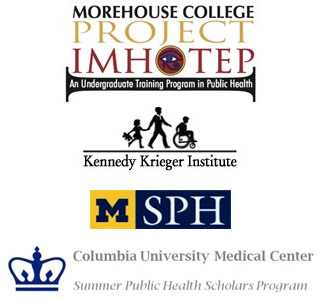
CDC’s Undergraduate Public Health Scholars (CUPS) Program-Investing in the Future of Public Health
The Office of Minority Health and Health Equity (OMHHE) supports internship opportunities for qualified undergraduate and graduate students to gain meaningful experiences in public health settings. Whether a summer internship or a year-long fellowship, OMHHE’s goal is to provide young professionals valuable exposure to a wide range of public health opportunities. The CDC Undergraduate Public Health Scholars (CUPS) program consists of six internship opportunities creating a public health workplace experience to increase student interest in minority health. In this edition of Health Equity Matters, Jacob Barrera, who was a part of the first CUPS cohort, explains how the program shaped his decision to remain in public health. Three CUPS participants share adventures from their 2016 experiences. You will also learn about the overall impact of the CUPS program from its young and diverse professional alumni and their perspectives on how to advance health equity through their public health work.
Why CUPS Matters-A Perspective On The Future of Public Health
Jacob Barrera, MPH (c)
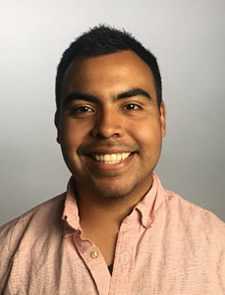
School(s) Attended: Pomona College and the Harvard T.H. Chan School of Public Health
CUPS Program: Future Public Health Leaders Program (FPHLP) 2012
Degrees Earned: Currently finishing an MPH in Health Policy
Current Workplace: The Fenway Institute and Facing Cancer Together
Current Position: Health Policy Research Fellow and Outreach Coordinator
In 2012, I was selected to be part of the inaugural cohort of the CUPS program. I was a rising junior at Pomona College, where I had recently given up on my dream to become a doctor. I knew that I wanted a future in healthcare and the CUPS program provided me with such an opportunity.
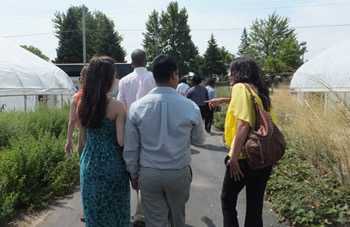
FPHLP participants learning about the importance of urban farms in creating sustainable living for marginalized
The CUPS program challenges students to think beyond the schemas that have been determined by our own walks of life. Each one of my fellow Future Public Health Leaders Program (FPHLP) participants brought with them a different mindset, a different outlook, and a different struggle. It was through this diversity of perspectives that I learned that there is not a single correct way to address health disparities—it’s a tiered approach. To address health disparities, one must have the ability to communicate across public health disciplines and systems that divide a policymaker from a healthcare navigator, and a healthcare provider from a social worker. The future of public health needs to be intersectional and these are the seeds that CUPS inadvertently plants in each one of its participants.
CUPS opened my eyes to the importance of the diversity of perspectives in public health. Furthermore, it gave me the tools not only to understand public health through a minority health lens, but also to challenge the notion of public health in the U.S. for the betterment of minority communities. Because of this, not only am I completing a Master of Public Health in health policy, but I am also applying to law school in the fall of 2017 with the goal of addressing health disparities from a legal perspective. With CDC’s investment in programs such as CUPS, students like myself are given the opportunity to explore public health careers aimed at making health equity achievable across the nation.
Project IMHOTEP
Project IMHOTEP is an 11-week summer program designed for undergraduates in their junior and senior year and recent baccalaureate degree students. Throughout the program, interns participate in a wide variety of seminars, workshops, and other educational initiatives and must complete a required number of community service hours. The interns receive training and support in data analysis and other project requirements. At the conclusion of the program, interns deliver an oral presentation, poster, and submit a written manuscript suitable for publication in a scientific journal.
Project IMHOTEP Alumni-Where Are They Now?
Marcus R. Andrews, MPH
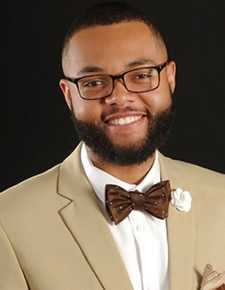
School(s) Attended: George Washington University (undergraduate and graduate)
CUPS Program: Project IMHOTEP, 2015
Degrees Earned: Bachelor of Arts in Sociology, 2015; Master of Public Health, 2017
Current Workplace: National Institutes of Health
Current Position: Post-baccalaureate Intramural Research Training Awardee (Postbac IRTA)
The CUPS program provided me with additional skill sets to contribute to the field of public health and health disparities. While working with Dr. Tiffany Powell-Wiley at the National Institutes of Health, our research used epidemiologic methods and geographic information systems (GIS) to understand the socioeconomic, psychosocial, and environmental factors that promote weight gain and cardiovascular risk factors among multi-ethnic populations. Today, this information is now translated into community-based interventions targeting barriers to weight loss for at-risk populations in the Washington, D.C. metropolitan area. Using the skills acquired through Project IMHOTEP and the Morehouse School of Medicine, I was able to find my passion for community health and expand my knowledge base in geospatial health disparities.
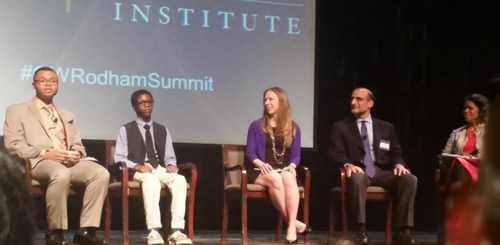
Serving on a childhood obesity panel with Clinton Foundation Vice Chair, Chelsea Clinton and Alliance for a Healthier Generation CEO, Howell Wechsler.
Using the social determinants of health lens, neighborhood context and the built environment are among the greatest needs in public health. As the gap between the affluent and the poor become increasingly wider, and subsequently more apparent, neighborhood contexts are influential in health outcomes. Many impoverished neighborhoods lack some of the basic amenities that their affluent counterparts have, including access to full service grocery stores, public fitness facilities, clean drinking water, and adequately funded schools. Oftentimes, gentrification is seen as a potential solution to the lacking infrastructure in some impoverished neighborhoods. However, the economic growth ultimately impairs the disadvantaged as they are often displaced from their previous neighborhoods, forced into other disadvantaged communities, and isolated from adequate access to healthy lifestyle amenities.
Genesis R. Bojorquez MSNc, RN
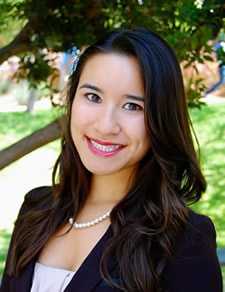
School(s) Attended: San Diego State University, 2015; University of San Diego, 2017
CUPS Program: Project IMHOTEP, 2015
Degrees Earned: Bachelor of Science, Nursing; Master of Science in Nursing, Executive Nurse; PhD (c)
Current Workplace: University of California San Diego Medical Center, Hillcrest
Current Position: Clinical Nurse II
While working in a hospital that is located in a medically underserved area, I am in a prime position to holistically promote both directly and indirectly. Nurses assist in the prevention of illness and injury and advocate for the care of individuals, families, and populations. It is my priority, while working to improve health equity in our community, to be a patient advocate and alleviate the effects that poverty inflicts on health outcomes.
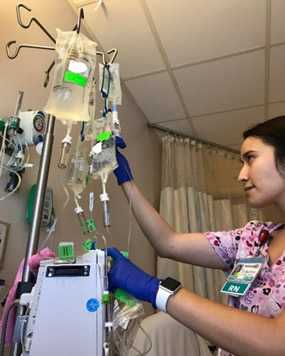
Troubleshooting intravenous medication at bedside
The CUPS program has set a trajectory for me both professionally and academically. CUPS provided me with the motivation and resources to succeed in the graduate school application process, and the internship solidified my interest in public health research. My entire CUPS experience was phenomenal and I formed life-long relationships with my mentors and other interns.
The health care sector needs to improve their efforts in addressing health disparities. Finding appropriate community services, and developing care plans can be time consuming and while electronic health records have made health systems more connected, there has not been a corresponding development between health care providers and community-based organizations, faith-based institutions, and government benefits programs that play an important role in helping populations with health disparities, including racial and ethnic minorities, socioeconomically disadvantaged individuals, and medically underserved patients.
Janessa Aneke

School(s) Attended: Emory University, 2015; Johns Hopkins School of Public Health, Doctorate (c)
CUPS Program: Project IMHOTEP, 2015
Degrees Earned: Bachelor of Science, Biology
Current Workplace: Johns Hopkins School of Public Health
Current Position: Doctoral Student
In my current work as a graduate student in the department of Molecular Microbiology and Immunology, I study parasitic diseases that disproportionately affect Africans. My work serves to advance health equity by studying mechanisms of disease that will ultimately answer important questions for drug and vaccine development. This work can lead to novel disease control strategies that could advance medicine towards disease eradication.
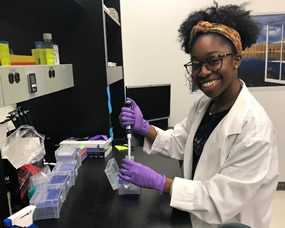
Evaluating a novel methodology for sequencing expressed variant surface glycoprotein (VSG) genes in Trypanosoma brucei.
Being a part of CUPS was impactful for my career in public health given the exposure the program provided. CUPS acquainted me to both work life at the CDC and other health organizations and opportunities in public health education and training. I completed CUPS/IMHOTEP directly after I graduated with my bachelor’s degree, and the program allowed me to transition into the public health sphere while also continuing my career in the basic sciences. Lastly, CUPS introduced me to my place in public health by exposing me to career paths for basic scientists in public health.
The greatest needs in public health are difficult to pinpoint. There will never be a singular place to begin the work that undoes the systematic infrastructure that gives way to the social determinants of health. However, I believe that access is what makes public health work. For example, access to quality education, a healthy environment, and healthcare are positively correlated with producing good health outcomes. Breaking down the barriers of access is the greatest need in public health to improve the health of populations globally.
Kristin Holmes
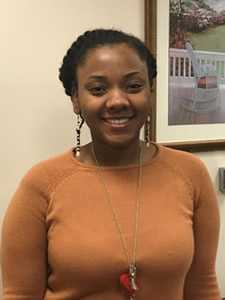
School(s) Attended: Spelman College, 2015
CUPS Program: Project IMHOTEP, 2015
Degrees Earned: Bachelor of Arts Psychology, Public Health
Current Workplace: Inova Health System
Current Position: Human Research Protection Program Coordinator
I currently work directly with more than 100 research studies that focus on a plethora of health topics, many of which seek to address health inequities. In my current position, I work to ensure that all human subjects involved in any aspect of research are protected, justly treated, and informed. My work is to promote ethical standards, compliance by medical and research professionals, and to complete reporting requirements that regulate human research so that it is beneficial to the field.
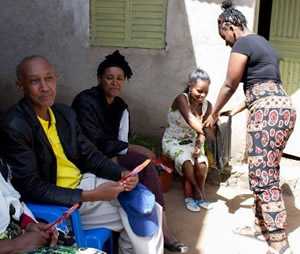
Hosting a community health fest in Addis Alem, Ethiopia in 2016.
The CUPS program was an enlightening way to begin my postgraduate career in public health. My experience at CDC taught me a few of the numerous ways to challenge health inequities. I was able to work on a health disparities research project that addressed inequities across a range of demographics. CUPS also challenged me to use resources at CDC to expand my outreach, and I was able to network and learn from public health professionals that have impacted the public health field in their own work. I often cite my CUPS experience in daily conversations as it, in many ways, directed me to where I am in my life now. Following the CUPS experience, I became a community health educator with the Peace Corps serving in the Sidama zone of Ethiopia. Once I completed that experience, I started working in my current position in a hospital research center where I am using the research and public health skills that I learned from being a part of CUPS.
The greatest need in public health is the placement of people who represent communities affected by health disparities and inequities in decision-making positions. Oftentimes, decisions made on the local, state, and federal government levels do not include input from these communities. Better representation and diversity in public health would likely improve social determinants such as suitable infrastructure, food security, and health care access for everyone. Primary prevention, which is the most sustainable form of prevention, would be more effective with input from individuals affected by health disparities. This process would require cultural competency and a deep familiarity with people from different backgrounds and worldviews, as well as diversity among decision makers, public health professionals, and community representatives.
Abraham N. Johnson, MPH (c)

School(s) Attended: Savannah State University, 2015; Georgia Southern University, present
Degrees Earned: Bachelor of Science, Biology; Master of Public Health (c),May 2018
CUPS Program: Project IMHOTEP, 2015
Current Workplace: Georgia Southern University
Current Position: Health Promotions Coordinator “Project PrEP”
As the project coordinator for Project PrEP, I am in charge of conducting health education workshops for men who have sex with men (MSM) in rural South Georgia on Pre-Exposure-Prophylaxis (PrEP). PrEP is a once a day pill for individuals who are HIV negative. It has been proven effective in preventing HIV infection when used in conjunction with a condom. Although information on PrEP is available throughout the state, there are large numbers of MSM men in rural South Georgia who are not aware. My job is to promote PrEP awareness through educating and empowering the MSM community to increase knowledge about and access to PrEP in rural Georgia.
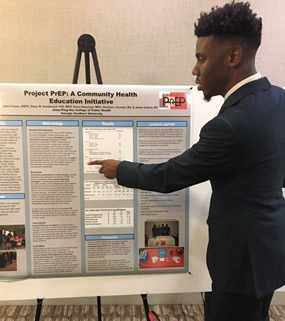
Presenting research at the NAESM Inc. 2017 Conference.
Being a CUPS program participant exposed me to a myriad of opportunities in the field of public health. As a scholar, I gained hands-on experience as an intern at NAESM Inc., an organization that addresses the health and wellness issues of black gay men through advocacy, services, and education. As an intern, I learned about the importance of health promotion and community outreach.
The greatest need in public health is access. In order to create healthier communities, we must ensure that everyone has equal access to healthcare and education no matter their socioeconomic status.
Future Public Health Leaders Program Alumni-Where Are They Now?
Lorraine Louise K. Francisco, B.S.
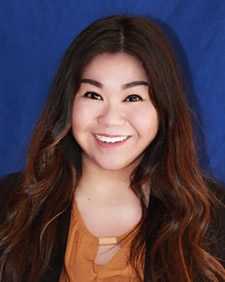
School(s) Attended: University of Nevada, Las Vegas (undergrad; deferred my acceptance to grad school for PHAP)
CUPS Program: FPHLP, 2015
Degrees Earned: Bachelor of Science, Health Care Administration & Policy, May 2016
Current Workplace: CDC’s Public Health Associate Program (PHAP)
Current Position: Public Health Associate/Research Data Analyst
As an associate in CDC’s PHAP, I worked at the local health department in Phoenix, Arizona in tuberculosis (TB) elimination research. The State of Arizona is one of the top refugee resettlements in the U.S., so I learned firsthand the unique challenges these communities face. More specifically, in TB research we advance health equity by continuously exploring ways to more effectively detect and treat TB infection among refugees and other foreign-born population groups both locally and nationwide. As a side project, I am also involved with quality improvement efforts within the health department.
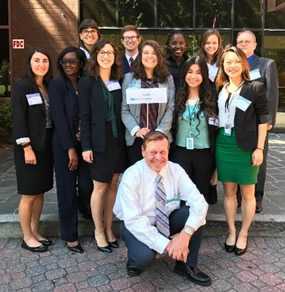
Lorraine (first row, 2nd from the right) with her CDC PHAP supervisor group in Atlanta, GA
Being in the CUPS Future Public Health Leaders Program (FPHLP) helped me to explore the many different paths of public health. I always knew it was a broad field, but connecting with other public health scholars from across the nation and the world gave me a unique perspective of my options within this field. I received invaluable public health training as a young undergraduate student through FPHLP’s curriculum, fieldwork, extracurricular projects, and by simply networking with other students. I also made some lifelong friends and mentors while in this program and will forever be grateful for the opportunity.
As a young public health professional working at the local level in Phoenix, I think one of the greatest needs in public health is enhanced collaborations between public health programs and healthcare systems. Although these two fields are closely related, things often fall between the cracks. This could be avoided with through stronger and better partnerships.
Amanda Tjemsland, BA, MPH (c)
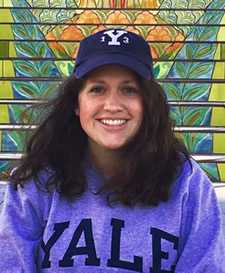
School(s) Attended: Yale University (2015); University of California Berkeley, present
CUPS Program: FPHLP, 2012
Degrees Earned: Bachelor of Arts, History of Science, History of Medicine
Current Workplace: Currently enrolled in MPH program concentrating in Epidemiology/Biostatistics
Previous Positions: Public Health Associate for CDC at the Albuquerque Area Southwest Epidemiology Center (2013 – 2015), Health Science Specialist, Center for Innovation to Implementation, Palo Alto Healthcare System (2015 – 2017)
My work at the Veterans Administration focused on addressing substance abuse among veterans and identifying cost-effective ways to reduce substance abuse relapse. Substance abuse disproportionately impacts the veteran population, especially those suffering from mental illnesses. CUPS allowed me to see the variety of opportunities available to those in the public health field. It also introduced me to peers in my field with whom I have continued to work with for several years. The most important opportunity I gained from CUPS was learning of the Public Health Associates Program, and being selected to work as a Public Health Associate right out of college.
I believe that the greatest need in public health currently is creating environments where healthy choices are the primary choices. In many minority communities, and especially on Native American reservations where I have worked, healthy choices aren’t readily available. All communities should have equal access to fresh fruits and vegetables and safe sidewalks to walk. By prioritizing these changes for communities, healthier lifestyles can be built into the environment which can prevent chronic illnesses that disproportionately impact these communities.
Ferguson Fellowship
The Dr. James A. Ferguson Emerging Infectious Diseases Fellowship is a 9-week summer program for students currently enrolled full-time in a medical, dental, pharmacy, veterinary, or public health graduate program who are interested in infectious diseases and health disparities research. Ferguson Fellows are encouraged to submit their research to national meetings and for publication.
Taha Yasin Taha
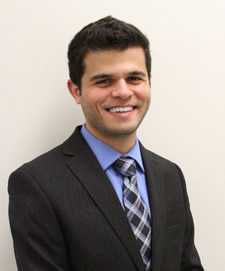
Ferguson Fellow, 2016
Kennedy Krieger Institute
“As a Ferguson Fellow, I was assigned to the diagnostics branch in NCEZID to work on the development of a serological assay for the detection of monkeypox virus in endemic areas. I worked alongside experts in the field and gained extensive experience in immunological assay development. I also had the opportunity to expand my scientific presentation skills before a diverse audience at weekly branch meetings. Most importantly, I learned the true value of public health throughout my experiences working both inside and outside of the lab.
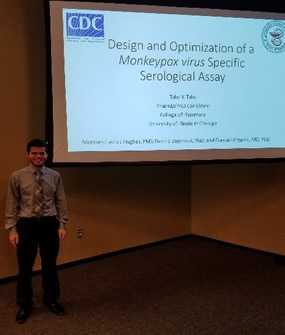
While I was a fellow, the Zika outbreak was in its prominent stages. My task was to aid in the development of antibodies against the virus for diagnostic purposes. I was able to apply the skills I learned in the first weeks of the fellowship to an important emerging infectious disease. This is a great example of the utility of the skill set that I gained through the fellowship. I learned that it takes many individuals with various experience to manage a global public health issue. The CDC was a great place for me to learn how to work with other individuals to achieve that goal.
CDC’s unique work culture and ethic has prepared me for my future education and career goal in global public health. This program is important in guiding the career choices of undergraduate college students like myself. In addition to the technical experience gained, I would recommend CUPS because it is an amazing opportunity to experience a leading national public health organization.”
Summer Public Health Scholars Program
The Summer Public Health Scholars Program is a 10-week training program for undergraduates in their junior and senior year and recent baccalaureate degree students. The program begins with a trip to the Centers for Disease Control and Prevention to introduce students to public health professionals working at the federal level. Throughout the summer, participants receive leadership training, orientation to the public health disciplines, and real world work experience. At the conclusion of the program, interns deliver an oral presentation and submit a final paper on a public health challenge or intervention.
Jasmine Burton
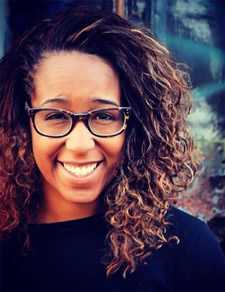
The Summer Public Health Scholars Program
The Office of Diversity & Multicultural Affairs
Columbia University Medical Center, College of Physicians and Surgeons
“Participating in the Summer Public Health Scholars Program (SPHSP) as a CUPS scholar was my entry point into the world of public health. Fully immersing myself in the Mailman School of Public Health introductory coursework, my New York City Department of Mental Health and Hygiene internship, and my GRE Kaplan course all while developing life-long friendships with some of the most inspiring people I have ever met, taught me the power of passion.
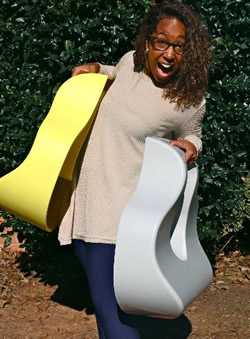
I had never experienced health and all of its exciting and nuanced vantage points until I sat in a classroom with Dr. Robert Fullilove, Associate Dean for Community and Minority Affairs and Professor of Sociomedical Sciences at Columbia University. I had never known that I was capable of being interested in the prevalence of adult asthma in East Harlem until I conducted my first literature review and health survey. I also hadn’t fully realized how much I knew I wanted to pursue my master’s degree in public health until I was given the incredible opportunity to be supported through GRE preparation. And most of all, I hadn’t realized how much people, beautifully diverse and passionate people, had inspired me to be the very best version of myself that I could possibly be. Looking back, almost four years ago, and seeing the incredible feats members of my cohort have accomplished has kept me inspired and excited to be a part of the global health movement. From serving in the Peace Corps to pursuing PHDs, MDs, and master’s degrees at some of the best universities in the world to being grassroots community leaders, I am proud to forever be affiliated with my SPHSP 2013 cohort.
Based on the incredible and eye opening experiences that changed my life, I would recommend the CUPS program without hesitation. It is a family of incredible global change makers that I am immensely grateful to be a part of. Ultimately, I seek to utilize design to advocate for universal health, and being a 2013 CUPS scholar truly enabled this dream to be possible!”
For more information about the CUPS Program and other CDC student sponsored opportunities, visit CDC’s website.
Pitch Black—Where the Hackathon Meets Public Health
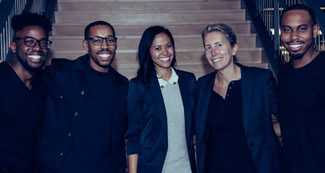
Pictured (from l. to r.) Benjamin Cole; Anthony Tucker; Naomi Jefferson, Pitch Black Judge; Anita Elberse, Harvard Professor; and Luthan T. Hill.
Imagine having five hours to come up with a solution to a major societal issue with the possibility of funding for your project at stake. That is the impetus behind Pitch Black, a single-day competition focused on developing solutions to issues currently facing the African-American community. Pitch Black is a hackathon-style competition formed as an independent project by Anthony Tucker, Benjamin Cole, and Luthan Hill, three Harvard Business School graduates. Hackathons are usually competitive events where people work in groups with the goal of creating a functioning product by the end of the event. Tucker, Cole, and Hill decided to use the hackathon concept to create a platform to positively impact their community in four core areas: education, economic development, community engagement, and public health.
“Most hackathons, or idea pitch competitions, are centered on creating a software or business idea,” said Benjamin Cole, Pitch Black co-founder. “We wanted to create a vehicle for change that has never been done before where citizens come up with actionable solutions to help their own communities.”
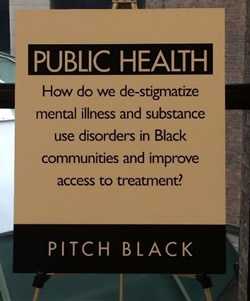
The trio formed a partnership with NBA champion Dwyane Wade of the Chicago Bulls. Wade had a mutual interest in community-based solutions plus a philanthropic track record. With support from both Wade and City of Chicago officials, the inaugural Pitch Black hackathon took place on Saturday, April 1, 2017, on the campus of Harvard Business School in Boston, Massachusetts. Twenty-four cross-disciplinary teams, with the help of several Chicago area high school students who were flown in to participate in the event, gathered to address one of the following four questions specific to the needs within the City of Chicago:
- Education: How can Chicago incentivize public schools and students to prioritize post-secondary planning?
- Economic Development: How can Chicago encourage economic development and growth in challenged communities but avoid gentrification and displacement?
- Community Engagement: How do we engage African Americans under the age of 30 in the political and policy making process?
- Public Health: How do we de-stigmatize mental illness and substance use disorders in Black communities and improve access to treatment?
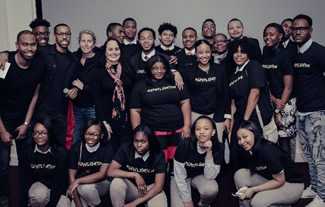
Chicago area high school students with Pitch Black founders.
After discussing approaches and developing solutions, all teams then made a 2-3 minute pitch to a panel of business leaders, professors, and city officials who served as judges. Winners from each of the four areas presented during the final competition, Pitch Black HBS Winners Weekend, which took place on Friday, August 4, 2017 in Chicago.
“I’m happy to come together with the City of Chicago to listen to our young adults and elevate the ideas they have to bring about lasting change to every community in my hometown,” said Wade, in press statement released by the City of Chicago.
Using CDC data, the public health team emerged as Pitch Black’s first hackathon winner with their POP-UP X concept to address the stigma around mental illness and substance use disorders.
“We created POP-UP X because it uses familiar channels such as art and entertainment to initiate conversations on mental illnesses that are known to make people uncomfortable,” said Lauren Rosenblum, POP-UP X team member.
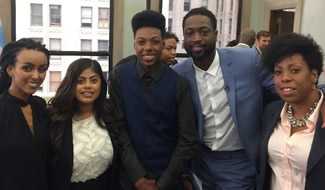
Pictured (from l. to r.) POP-UP X team members Senait Ghebrehiwet, Shruti Shantharam, unidentified event attendee, Dwayne Wade, and Katrina Hobbs Everett. POP-UP X team members not pictured, Lauren Rosenblum and Anna Lasko.
POP-UP X is a “pop-up” creative space for artistic expression using Chicagoʼs existing art scene. Attendees will share their related experiences through their preferred art medium. The creative forms, ranging from paintings and film to photography and spoken word, will focus on educating the public about mental illness and substance use disorders. Licensed social services professionals will also be on hand to offer services and make connections, where appropriate.
“In the long term, we hope that through POP-UP X we are able to build capacity within local communities to provide mental health and substance use disorder services in a sustainable manner.”
The final project award amount will be announced at a later date. For more information, visit the Pitch Black website.
The Future of Public Health at CDC-Young Professionals Network (YPN)
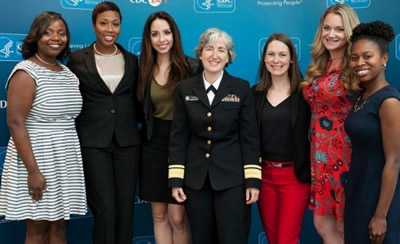
Former YPN executive board members after the annual YPN conference with former Acting CDC Director, Anne Schuchat, MD (RADM, USPHS).
Where do young, dynamic public health professionals go to connect for support and professional development? Answer: The Young Professionals Network (YPN) at CDC, the only employee organization solely focused on the needs of early career professionals. The organization started as an idea of Anant Shah, a former early career professional at CDC. He believed the establishment of CDC’s YPN as an official CDC employee organization was highly important, as CDC has a great number of early career professionals who could benefit from peer-to-peer interactions, mentoring, and support that would promote an enriched work environment.
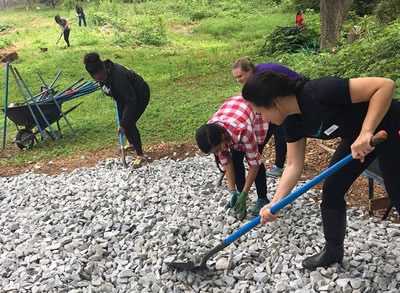
YPN community service activity in Atlanta.
“As a career professional transitioning from consulting to public health informatics, YPN has been a foundational resource for me to further professional development skills and network with other public health professionals at various stages of their career while giving back to the community and engaging YPN’s community service initiatives,” said Angela Chambliss, YPN President.
YPN also encourages community service, professional and personal development, and networking among early career professionals. Members host a variety of educational and informative events such as information sessions on retirement plans and workforce development opportunities.
“CDC already has a tremendous legacy. As a young person working in the government, I think it’s very important to maintain that legacy, using whatever innovations we can to keep us at the leading edge in every aspect of our work,” said Aidan Ganzert, YPN Vice President of Social Events.
Outside of the office, YPN frequently hosts social events throughout the metro Atlanta area, allowing members to network while engaging in fun, rewarding activities. The group frequently collaborates with Habitat for Humanity helping to build homes, or plant fresh, healthy foods alongside Concrete Jungle.
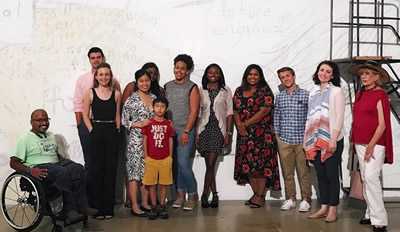
YPN networking social event.
“YPN provides a dynamic opportunity for young professionals to positively impact the community through volunteerism, while also fostering an environment to share best practices and cultivate professional development,” said Shari McKenzie-Hicks, YPN Executive Treasurer.
Looking to get involved in YPN? Email ypn@cdc.gov to be added to the listserv for ther YPN E-Blast, an online newsletter highlighting YPN’s upcoming events and other important updates.
- Page last reviewed: August 29, 2017
- Page last updated: August 29, 2017
- Content source:


 ShareCompartir
ShareCompartir